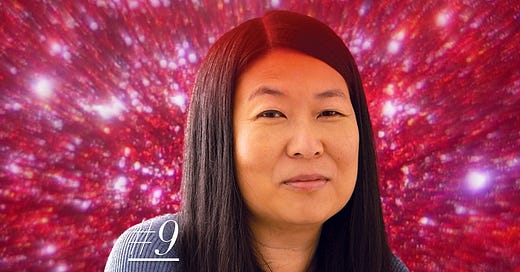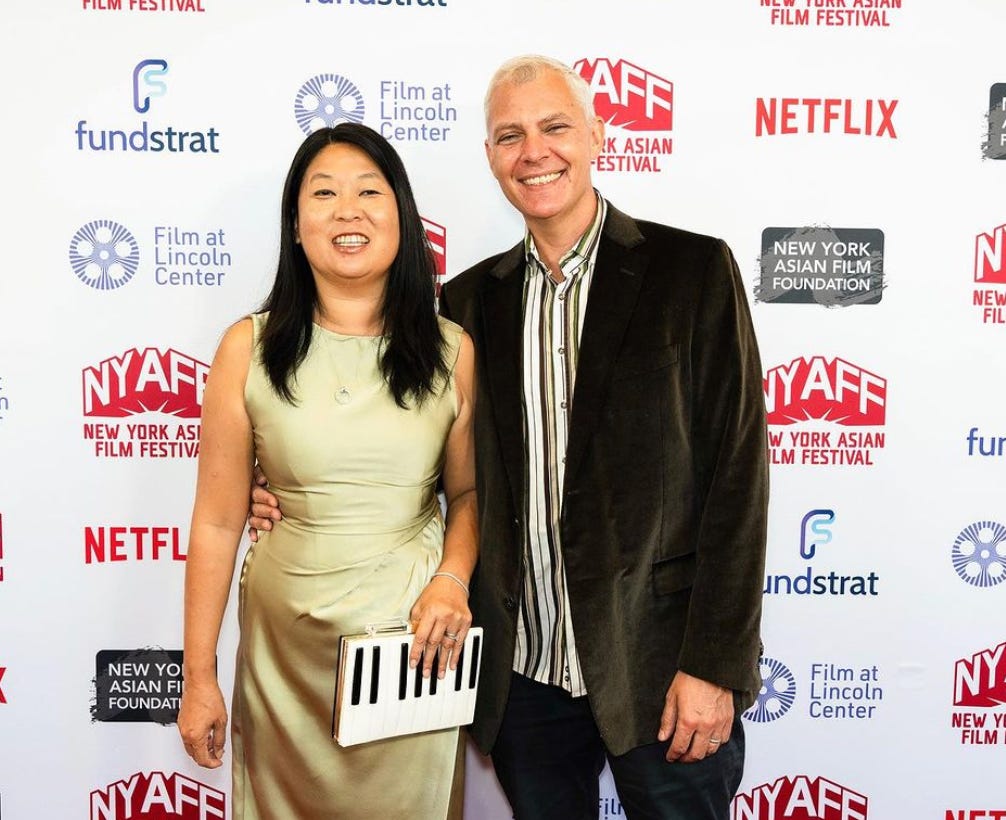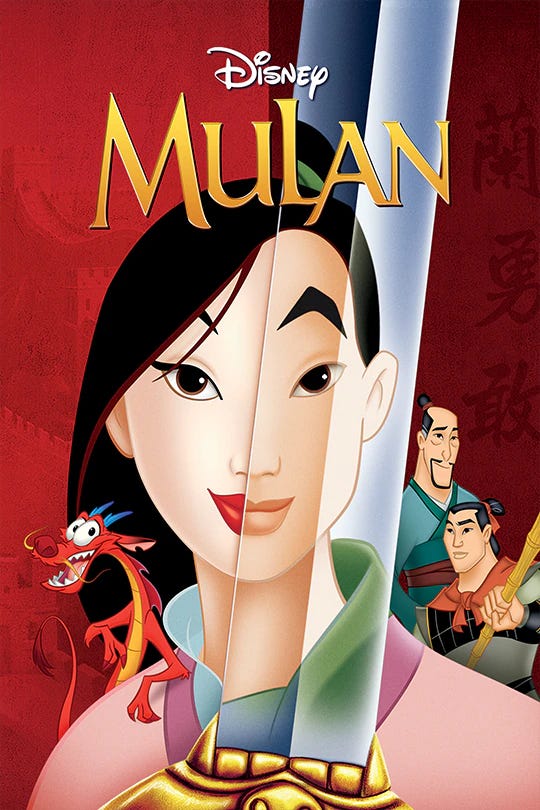Asian A.V. Club newsletter #9: Peilin Chou
Producer Peilin Chou talks to us about how she forged her own path in Hollywood and the personal fulfillment of being able to tell stories from an Asian perspective to a whole new generation.
In her 20+ years of working in Hollywood, producer Peilin Chou has always followed her creative mission to tell Asian and Asian American stories to the world. Whether it’s about a lost yeti trying to find his way home (Abominable) or a young girl who builds a rocket ship to meet the moon goddess Chang’e (Over the Moon), the common thread of these stories is that even though it’s told the lens of Asian protagonists, their experiences transcend cultural boundaries and unites all those who watch her films.
On her latest project The Monkey King, Chou takes on an even bigger challenge of bringing a fresh take to the much loved hero from the classic Chinese novel Journey to the West.
We got to talk to Chou a few weeks back as she world premiered her film, The Monkey King at the New York Asian Film Festival.
Asian A.V. Club: We are big fans of the origins story, and I was wondering if you could tell me how you got your start in the industry.
Peilin Chou: I was born in Taipei, Taiwan, that's the beginning of the origin (laughs). I moved to the US when I was five and I grew up in Northern California. It definitely was at a time where you never saw anyone that looked like me on film and television. Maybe the rare glimpse of the butler in the background, or the restaurant worker, and when it did happen, it was always a big event in our family.
I also grew up not knowing anyone that worked in film and television and not having any awareness that it was something you could do for a living. But I always had a passion for storytelling and creating shows in my living room.
When I was young, we went on vacation to LA, and it was the first time I had exposure to Los Angeles. My family was super excited to go to Disneyland and all I wanted to do was the NBC studio tour (laughs). Like I was obsessed with that, but we didn't get to do it because it was not planned. But my parents humored me and drove by and took a photo in front. And that was it.
Fortunately, I ended up going to college at UCLA and I studied communication studies. For one of the classes, you were required to do internships in the industry. And I found myself interning at a television show called Life Goes On. Now what made Life Goes On so unique was that it was the first-time a character with Down Syndrome was featured on television. It was also the first time an HIV positive character was featured on television too. As the intern, it was my job to read all the fan mail. So literally, on a weekly basis, I was reading hundreds and hundreds of letters from people who were writing about how this show was changing their lives, because their son had Down syndrome, or their brother was HIV positive, and it was making them feel seen. And I realized that it was also putting something into the conversation that was non-existent prior.
Asian A.V. Club: How did that experience affect you?
Peilin Chou: I got this very unique perspective of how powerful this television show was, and how meaningful it was just so many people. And so for me, that was kind of lightbulb moment where I realized that storytelling is so uniquely powerful in its reach. Especially towards the cause of people like me, who felt like they were not being seen. So, I pivoted to pursuing a career in film and television specifically looking for opportunities to be involved with projects that would feature Asian characters and Asian American stories.
Asian A.V. Club: It's kind of fascinating when I was looking at your career, I realized you went into a space where there wasn’t a space for people like you and yet you found a way to push in. Has that drive been in you from day one or did you have to learn how to create that space for yourself?
Peilin Chou: I think it's so funny how you describe it like, when there's no space, I just pushed my way in. My husband would be very much in agreement with the description of that trait (laughs). Perhaps this isn't personality driven, but I kind of fell into my first job at Disney after graduating from UCLA. There was an executive in training internship program at Disney and it was brand new that year. Actually, it was the first and only year that it existed after I did it. After my yearlong internship, they promoted me to creative executive. Now prior to that, I didn't even know what a creative executive was, or what story development is, so I kind of just fell into it and tried to do it to the best of my ability.
Then I found myself at the nucleus of story development at a major studio. And it was such a unique opportunity because Disney was just working on Mulan.
One of the major amazing things about working on Mulan was that in the hundreds of people that made that film, there were probably three Asian people involved. I was one of them and the writer (Rita Hsiao) was another, and we like bonded like crazy. We saw how much impact we had because major things in the story changed because of our involvement. So, it really showed me that perspective is really important.
From that insight, a lot of my drive has been for me to ask, if I don't do this, who's gonna do this, cause there's nobody else here. You know what I mean? Now, I didn't know that I would end up being able to have all these opportunities though (laughs).
Asian A.V. Club: Being a successful producer needs an element of being able to nudge a bit too.
Peilin Chou: I think a lot of film producing, and I think many producers of all types would say this, is like Jenga, pushing and nudging, and seeing which blocks move. Oh, this one is not gonna move, then alright, let’s try this one. You keep doing it until something gives, and then you keep building on it. I really feel like I've been so fortunate to be able to be working at a time, where my passion for these kinds of projects, also has aligned with the industry and these projects are getting supported and can be supported.
Asian A.V. Club: What was the industry like for Asians in Hollywood, when you first started?
Peilin Chou: When I first started in the industry, I think you could count on two hands literally the number of Asian people in Hollywood, including assistants (laughs). Back then, the Coalition of Asian Pacifics in Entertainment (CAPE) would have meetings and there will be like, eight people. Now you go to a mixer and there's like hundreds of people. So, the coming up of it has been amazing, but I will say the time between Mulan which was the first Chinese story told in a global animated film, and Abominable which is the first time a modern-day Chinese family was featured in an animated film, that was 20 years. It's really been a slow burn (laughs).
But then after Abominable, I think that's when streaming really started to take off and created those other opportunities. And so pretty rapid fire-ly I got to do Over the Moon and now The Monkey King on Netflix. That's kind of the amazing thing about being on a global platform and being able to be bespoke to all different kinds of viewers. It has really created the opportunity for just so many more diverse voices to be heard.
Asian A.V. Club: The character of The Monkey King (孫悟空)is part of the Journey to the West series. When developing your version, what was the entry point, because not only is he such a beloved character, he’s also attached to this classic epic adventure.
Peilin Chou: We were obviously looking for a way that the story could be accessible to those that didn't know anything about the Monkey King. In that regard, an origin story seemed like the most natural way to go. We also felt because the novel is so famously dense and complex, we needed a character that was going to be the audience's entry point and guide into this crazy world. And that's how we ended up inventing Lin. The character of Lin is not in Journey to the West, she's completely our invention. And at some points, we referred to it as a lost chapter in the Monkey King, nobody knows about it, but this is what happened (laughs).
We were also cognizant of wanting to make it feel fresh and exciting to those that did know the story. And we felt like having this additional character would help on that front as well. One thing unique, to our knowledge, that has not been done in other explorations of Journey to the West is that we really leaned in on making the ‘stick’ a character. Even though he doesn't speak in words, he obviously communicates with sounds and lights and bleeps and has like a very special rapport with Monkey. And though it's an implied relationship in the book, we really actualize it in a new and interesting way. So, all those things we hoped would strike the balance of whether you know anything about monkey, or you know a lot, but it's still fresh and fun.
Asian A.V. Club: What I appreciated also was that you delved into how Monkey became the character that you see in Journey. And you also didn’t make him learn his lesson and become this clean-cut perfect hero by the end of this film.
Peilin Chou: It was super, super important to us, that Monkey remain true to Monkey. Because the last thing we wanted was in the end, he learns this lovely lesson, and now he's a very warm, generous Monkey. That would be ridiculous, right? But what we tried to do was give him a lot of challenges and obstacles when he was young, so that people would understand where that comes from.
Asian A.V. Club: Was that one of the conversations you had with Stephen Chow (Kung Fu Hustle, Shaolin Soccer, Journey to the West) who is an executive producer on this film?
Peilin Chou: Exactly. Those things were really important to Stephen (Chow), who obviously is a bit of a Monkey King / Journey to the West aficionado, given his career. And I think, very famously, in a lot of his films, he creates these underdog characters that you really get to know and root for in the beginning and then they can be as awful as they want for the rest of the movie. You know why? It’s because you know what's driving them and yet you still love them and forgive them and root for them.
It was a very delicate balance for sure. I think that we rewrote the ending 10 times, when Lin comes to say goodbye in the cave to Monkey. We had to find the right balance of, he's still Monkey, and he's not changing and evolving too much, but he does really care about this girl. She’s this one person that connected with him and went on this adventure with and maybe he learned like a tiny grain of sand of something. But we were very, very insistent on having the epilogue in there, when Piggy and Sandy and the Monk show up to get him as a nod to those that know Journey to the West. He’s still gonna go out there and be Monkey even after 500 years.
Asian A.V. Club: The Monkey King had an opportunity to premiere at the New York Asian Film Festival (NYAFF), what was it like to show this film to this audience in particular?
Peilin Chou: When I was watching The Monkey King at the New York Asian Film Festival, there were a lot of younger people in the audience that I knew who did not know anything about this character. And it was really fascinating to watch it through their lens. Because I've grown up with this character my whole life and I've known it and loved it. But if you knew nothing about it, it's like wow, this is a really weird movie, in a good way (laughs). Just the way the characters are and what they're doing and where they're going between dimensions, it’s like, wait, what is this?
As I mentioned before, it’s been a wonderful alignment of timing and having decision makers that believed in this movie. They saw how (this story) could be wildly appealing and still be a meaningful part the dialogue. I’ve been really fortunate.
Asian A.V. Club: Now that you’ve been able to tell stories of these large iconic Chinese characters like Chang’e (Over the Moon) and Monkey, what do you think is the progression of Asian stories? Can there be smaller less fantastical stories about everyday Asians that can be told?
Peilin Chou: I think that definitely there is that space. A really good example of it is Turning Red. I adore that movie and I doubly adore the fact that I had nothing to do with it (laughs). It exists in the world, and I think it is really amazing. But I think it's interesting that you point that out, because I feel in the journey of getting these movies made, you kind of had to sell it. You had to say something like, this is a really famous and beloved and iconic character in China, therefore giving the project that commercial hook. And mind you, I started developing The Monkey King in 2015, which was a very different landscape than we are at now. I actually have other projects in development, some of them Asian themes, some of them not. But the ones that are Asian themed are not iconic characters or stories. They're actually stories about everyday people and I think that there's definitely room for that, and I hope to make many, many more.
Asian A.V. Club: And WE look forward to seeing all of that too! Thank you so much for talking to us!
Peilin Chou: Thank you!
You would think that August would have been a quiet month of reruns and throwaway programming, but between new seasons of Only Murders in the Building, Heartstoppers and Reservations Dogs, plus the love watching of Special Ops: Lioness, the hate watching of …And Just Like That, AND don’t get me started on the return of The Traitors Australia or the upcoming mega adaptation of One Piece, this month is PACKED!!
But something else has happened this month that has surprised me. Having never been a k-drama obsessive, THREE series have got me so hooked that I am literally waiting for new episodes to drop on a weekly basis!!
Mask Girl (Netflix - all episodes now available)
The only k-drama on my list that has all eps for you to binge, I’ve actually been slowly savoring this twisted thriller as each episode takes on a fresh perspective with a different narrator. Without giving too much away, the whole series begins when Kim Mo-Mi (played excellently by first time actress Lee Han-Byeol), a lonely plain looking woman, who finds a way to escape from her humdrum ordinary officer worker life by donning a mask at night for her growing fandom online. You know that won’t end well. Wholly original and crazy, this is all I think you should know about this series. Enjoy the ride!
The Killing Vote (Amazon Prime Video / SBS - every Thursday)
A twisted vigilante somehow finds a way to get citizens to vote (on an app no less) if alleged heinous criminals deserve to live or die. A detective, an eager cyber crime analyst (it’s Lim Ji-yeon, the girl who played the UBER b**tch on The Glory!) and a prisoner who’s incarcerated for calmly killing his daughters murderer, unwillingly combine their efforts before the killer strikes again.
Moving (Hulu / Disney+ outside of US - every Wednesday)
Director Park In-je (Kingdom) takes on the superhero genre and crafts an epic complex tale of three teenagers with special powers and the parents that have spent decades trying to protect their identity. To compare it with a show like Heroes is super lazy, instead what you’re getting is an emotional, exciting series unlike anything I’ve seen. Big up to papa Jang Ju-won (played SO incredibly by Ryoo Seung-Ryong) who’s tale of falling in love while hiding away from the gangsters is just plain brilliant (seriously his backstory is two of the best hours of tv you’ll see this year). Easily one of my favorite shows of the summer!














